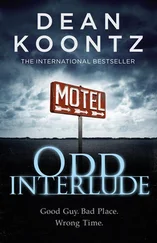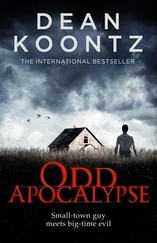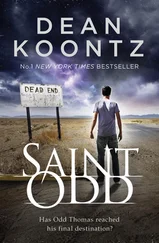"Which it might be able to do," I said, "while also keeping seven plates spinning atop seven bamboo poles."
"Nah," Brother Knuckles said. "Maybe three plates but not seven. We're good here. This is good."
Squatting beside Jacob, I said, "That's beautiful embroidery."
"Keeping busy," he said, his head remaining bowed, his eyes on his work.
"Busy is good," I said.
He said, "Busy is happy," and I suspected that his mother had counseled him about the satisfaction and the peace that come from giving to the world whatever you are capable of contributing.
Besides, his work gave him a reason to avoid eye contact. In his twenty-five years, he had probably seen shock, disgust, contempt, and sick curiosity in too many eyes. Better not to meet any eyes except those of the nuns, and those you drew with a pencil and into which you could shade the love, the tenderness, for which you yearned.
"You're going to be all right," I said.
"He wants me dead."
"What he wants and what he gets are not the same thing. Your mom called him the Neverwas because he was never there for the two of you when you needed him."
"He's the Neverwas, and we don't care."
"That's right. He's the Neverwas, but he's also the Neverwill. He never will hurt you, never will get at you, not as long as I'm here, not as long as one sister or one brother is here. And they're all here, Jacob, because you're special, you're precious to them, and to me."
Raising his misshapen head, he met my eyes. He did not at once look shyly away, as always he had done previously.
"You all right?" he asked.
"I'm all right. Are you all right?"
"Yeah. I'm all right. You… you're in danger?"
Because he would know a lie, I said, "Maybe a little."
His eyes, one higher in his tragic face than the other, were pellucid, full of timidities and courage, beautiful even in their different elevations.
His gaze sharpened as I had never seen it, as his soft voice grew softer still: "Did you accuse yourself?"
"Yes."
"Absolution?"
"I received it."
"When?"
"Yesterday."
"So you're ready."
"I hope I am, Jacob."
He not only continued to meet my eyes but also seemed to search them. "I'm sorry."
"Sorry about what, Jacob?"
"Sorry about your girl."
"Thank you, Jake."
"I know what you don't know," he said.
"What is that?"
"I know what she saw in you," he said, and he leaned his head on my shoulder.
He had done what few other people have ever achieved, though many may have tried: He had rendered me speechless.
I put an arm around him, and we stayed like that for a minute, neither of us needing to say anything more, because we were both all right, we were ready.
IN THE ONLY ROOM CURRENTLY WITHOUT children in residence, Rodion Romanovich put a large attaché case on one of the beds.
The case belonged to him. Brother Leopold had earlier fetched it from the Russian's room in the guesthouse and had brought it back in the SUV.
He opened the case, which contained two pistols nestled in the custom-molded foam interior.
Picking up one of the weapons, he said, "This is a Desert Eagle in fifty Magnum. In a forty-four Magnum or three-fifty-seven, it is a formidable beast, but the fifty Magnum makes an incredible noise. You will enjoy the noise."
"Sir, with that in a cactus grove, you could do some heavy-duty meditation."
"It does the job, but it has kick, Mr. Thomas, so I recommend that you take the other pistol."
"Thank you, sir, but no thank you."
"The other is a SIG Pro three-fifty-seven, quite manageable."
"I don't like guns, sir."
"You took down those shooters in the mall, Mr. Thomas."
"Yes, sir, but that was the first time I ever pulled a trigger, and anyway it was someone else's gun."
"This is someone else's gun. It is my gun. Go ahead, take it."
"What I usually do is just improvise."
"Improvise what?"
"Self-defense. If there's not a real snake or a rubber snake around, there's always a bucket or something."
"I know you better now, Mr. Thomas, than I did yesterday, but in my judgment you remain in some ways a peculiar young man."
"Thank you, sir."
The attaché case contained two loaded magazines for each pistol. Romanovich jammed a magazine in each weapon, put the spare magazines in his pants pockets.
The case also contained a shoulder holster, but he didn't want it. Holding the pistols, he put his hands in his coat pockets. They were deep pockets.
When he took his hands out of his pockets, the guns were no longer in them. The coat had been so well made that it hardly sagged with its burdens.
He looked at the window, checked his watch, and said, "You would not think it was just twenty past three."
Behind the white gravecloth of churning snow, the dead-gray face of the day awaited imminent burial.
After closing the attaché case and tucking it under the bed, he said, "I sincerely hope that he is merely misguided."
"Who, sir?"
"John Heineman. I hope he is not mad. Mad scientists are not only dangerous, they are tedious, and I have no patience for tedious people."
To avoid interfering with the work of the brothers in the two stairwells, we rode down to the basement in the elevator. There was no elevator music. That was nice.
When all the children were in their rooms and the stairwells were secured, the monks would call the two elevators to the second floor. They would use the mother superior's key to shut them down at that position.
If anything nefarious got into a shaft from the top or the bottom, the elevator cab itself would blockade access to the second floor.
The ceiling of each cab featured an escape panel. The brothers had already secured those panels from the inside, so nothing on the roof of the cab could enter by that route.
They seemed to have thought of everything, but they were human, and therefore they had definitely not thought of everything. If we were capable of thinking of everything, we would still be living in Eden, rent-free with all-you-can-eat buffets and infinitely better daytime TV programming.
In the basement, we went to the boiler room. The gas fire-rings were hissing, and the pumps were rumbling, and there was a general happy atmosphere of Western mechanical genius about the place.
To reach John's Mew, we could venture out into the blizzard and strive through deep drifts to the new abbey, risking encounter with an uberskeleton sans the armor of an SUV. For adventure, that route had many things to recommend it: challenging weather, terror, air so cold it would clear your head if it didn't freeze the mucus in your sinus passages, and an opportunity to make snow angels.
The service tunnels offered an avenue without weather and with no wind shriek to cover the rattling approach of the plug-uglies. If perhaps those boneyards, however many there might be, had all gone topside, to prowl around the school in anticipation of nightfall, we would have an easy sprint to the basement of the new abbey.
I took the special wrench from the hook beside the crawl-through entrance to the service passageway, and we knelt at the steel access panel. We listened.
After half a minute, I asked, "You hear anything?"
When another half minute had passed, he said, "Nothing."
As I put the wrench to the first of the four bolts and started to turn it, I thought I heard a soft scraping noise against the farther side of the panel.
I paused, listened, and after a while said, "Did you hear something?"
"Nothing, Mr. Thomas," said Romanovich.
Following another half-minute of attentive listening, I rapped one knuckle against the access panel.
From beyond exploded a frenzied clitter-clatter full of rage and need and cold desire, and the eerie keening that accompanied all the frantic tap-dancing seemed to arise from three or four voices.
Читать дальше
Конец ознакомительного отрывка
Купить книгу
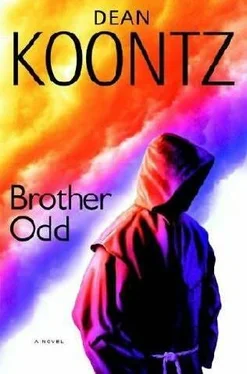

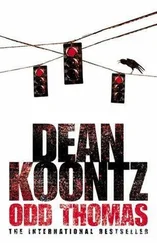





![Dean Koontz - You Are Destined To Be Together Forever [an Odd Thomas short story]](/books/705298/dean-koontz-you-are-destined-to-be-together-foreve-thumb.webp)

